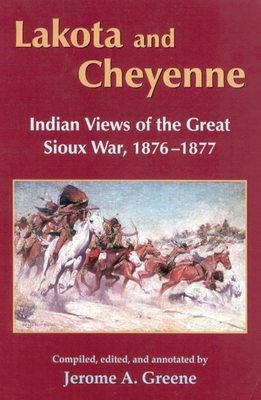Lakota and Cheyenne: Indian Views of the Great Sioux War, 1876-1877

Lakota and Cheyenne: Indian Views of the Great Sioux War, 1876-1877
The Great Sioux War of 1876-1877 is memorable to most Americans because of Lieutenant Colonel George A. Custer's last stand at the Battle of the Little Big Horn. But to the Lakotas (Western Sioux) and Northern Cheyennes who won that battle but lost the war, the experience of those fifteen months was truly a "last stand" - a cultural catastrophe that led to the reservation experience they had fought so long and hard to avoid. In writings about the history and import of the Great Sioux War, the perspectives of its Native American participants often are ignored and forgotten. In this volume Jerome A. Greene corrects that oversight by presenting a comprehensive overview of America's largest Indian war from the point of view of the Lakotas and Northern Cheyennes. A counterpoint to his earlier volume, which advances the military view of the skirmishes and battles - including the Little Big Horn - this book presents the Indians' report on the actions that ended their traditional way of life for all time. The accounts, by both men and women, afford fresh insights into the war. The Indian recollections provide personal, individualistic descriptions of significant events as the people struggled to protect their homelands, families, and tribal cultures. Most Sioux and Cheyenne accounts of the engagements remained within their own societies for many years. Those that were published during or soon after the war were colored by the defeat and often by mistranslation. This book presents a first-time compilation of the best of the Indians' recollections. The editor's introduction gives readers insight into the significance of Indian testimonial sources. Separate introductions place the Indians' accounts in the context of the war and enable readers to understand interrelationships among the events and thus gain a more complete appreciation of the war and its impact upon the Lakota and Cheyenne people.
PRP: 136.09 Lei
Acesta este Prețul Recomandat de Producător. Prețul de vânzare al produsului este afișat mai jos.
122.48Lei
122.48Lei
136.09 LeiLivrare in 2-4 saptamani
Descrierea produsului
The Great Sioux War of 1876-1877 is memorable to most Americans because of Lieutenant Colonel George A. Custer's last stand at the Battle of the Little Big Horn. But to the Lakotas (Western Sioux) and Northern Cheyennes who won that battle but lost the war, the experience of those fifteen months was truly a "last stand" - a cultural catastrophe that led to the reservation experience they had fought so long and hard to avoid. In writings about the history and import of the Great Sioux War, the perspectives of its Native American participants often are ignored and forgotten. In this volume Jerome A. Greene corrects that oversight by presenting a comprehensive overview of America's largest Indian war from the point of view of the Lakotas and Northern Cheyennes. A counterpoint to his earlier volume, which advances the military view of the skirmishes and battles - including the Little Big Horn - this book presents the Indians' report on the actions that ended their traditional way of life for all time. The accounts, by both men and women, afford fresh insights into the war. The Indian recollections provide personal, individualistic descriptions of significant events as the people struggled to protect their homelands, families, and tribal cultures. Most Sioux and Cheyenne accounts of the engagements remained within their own societies for many years. Those that were published during or soon after the war were colored by the defeat and often by mistranslation. This book presents a first-time compilation of the best of the Indians' recollections. The editor's introduction gives readers insight into the significance of Indian testimonial sources. Separate introductions place the Indians' accounts in the context of the war and enable readers to understand interrelationships among the events and thus gain a more complete appreciation of the war and its impact upon the Lakota and Cheyenne people.
Detaliile produsului










